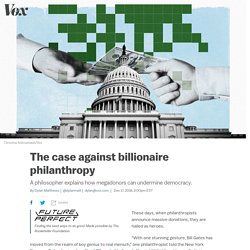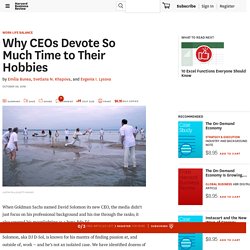

- Are you a robot? How the rich get spending money: Locking fine art in storage and borrowing against it. There’s a small but distinguished art collection in New York featuring an eclectic array of works.

“She Lied to My Face”: Inside the Hectic Last Days of Gymboree’s Retail Bankruptcy. America’s Professional Elite: Wealthy, Successful and Miserable. Redirect?&url= The rich haven’t become too immoral.

They’ve become too rich. Photo: Fabrice Coffrini/AFP/Getty Images Four decades ago, America’s rapacious capitalists and conservative moralists were singing in harmony. Jeff Bezos, Mark Zuckerberg: how billionaire philanthropy can hurt democracy. These days, when philanthropists announce massive donations, they are hailed as heroes.

“With one stunning gesture, Bill Gates has moved from the realm of boy genius to real mensch,” one philanthropist told the New York Times as Gates began donating billions to his foundation in 1998. When Warren Buffett announced he’d give his fortune to Gates to disperse, Fortune’s Carol Loomis called the move “typical Buffett: rational, original, breaking the mold of how extremely rich people donate money.” Just this past month, when Michael Bloomberg gave $1.8 billion to implement need-blind admissions at his alma mater, Johns Hopkins University, he received rapturous praise from bigwigs in higher ed.
It was not always this way. When John D. John Haynes Holmes, an influential Unitarian pastor, told Congress the foundation was “repugnant to the whole idea of a democratic society.” How the 0.001% invest - Investing and the super-rich. THINK OF THE upper echelons of the money-management business, and the image that springs to mind is of fusty private banks in Geneva or London’s Mayfair, with marble lobbies and fake country-house meeting-rooms designed to make their super-rich clients feel at home.

But that picture is out of date. A more accurate one would feature hundreds of glassy private offices in California and Singapore that invest in Canadian bonds, European property and Chinese startups—and whose gilded patrons are sleepwalking into a political storm. Get our daily newsletter Upgrade your inbox and get our Daily Dispatch and Editor's Picks. Global finance is being transformed as billionaires get richer and cut out the middlemen by creating their own “family offices”, personal investment firms that roam global markets looking for opportunities.
Stop Pretending You’re Not Rich. There’s a kind of class double-think going on here.

On the one hand, upper-middle-class Americans believe they are operating in a meritocracy (a belief that allows them to feel entitled to their winnings); on the other hand, they constantly engage in antimeritocratic behavior in order to give their own children a leg up. To the extent that there is any ethical deliberation, it usually results in a justification along the lines of “Well, maybe it’s wrong, but everyone’s doing it.”
The United States is the only nation in the world, for example, where it is easier to get into college if one of your parents happened to go there. Oxford and Cambridge ditched legacy preferences in the middle of the last century. The existence of such an unfair hereditary practice in 21st-century America is startling in itself. Why Aren’t Rich People Happy With the Money They Have? So people turn to dimensions of comparison that can be quantified. “Money is a terrific one,” Norton says. “If I need to know if I’m doing better than I was, the easy thing to ask is, Am I making more money? Or Does my house have more square feet? Why CEOs Devote So Much Time to Their Hobbies.
When Goldman Sachs named David Solomon its new CEO, the media didn’t just focus on his professional background and his rise through the ranks; it also covered his moonlighting as a bona fide DJ.

Solomon, aka DJ D-Sol, is known for his mantra of finding passion at, and outside of, work — and he’s not an isolated case. We have identified dozens of S&P 500 CEOs who have what is called “serious leisure” interests. These are hobbies and volunteering gigs that often start at a young age and that individuals continue to invest considerable time and energy into. Does serious leisure make you a better leader? The few studies that have looked at the job performance of CEOs with strong hobbies show mixed results. In our research, we set out to investigate why leaders make time for passionate leisure interests in their already impossibly busy schedules — and whether they feel it helps their job performance. A few common themes stood out about how their passion helps them: Secret luxury homes: how the ultra-rich hide their properties. When representatives of a young, wealthy Middle Eastern woman approached Tim Macpherson at the Mayfair office of estate agent Carter Jonas recently, he told them he had just the home for her: a period house costing more than £50m in one of London’s most upmarket areas.

The historic property had never had a For Sale sign outside nor been listed with any agent, though its owners had quietly informed Macpherson they wished to sell. Why we stopped trusting elites. For hundreds of years, modern societies have depended on something that is so ubiquitous, so ordinary, that we scarcely ever stop to notice it: trust.

The fact that millions of people are able to believe the same things about reality is a remarkable achievement, but one that is more fragile than is often recognised. At times when public institutions – including the media, government departments and professions – command widespread trust, we rarely question how they achieve this. And yet at the heart of successful liberal democracies lies a remarkable collective leap of faith: that when public officials, reporters, experts and politicians share a piece of information, they are presumed to be doing so in an honest fashion. The bad behavior of the richest: what I learned from wealth managers.